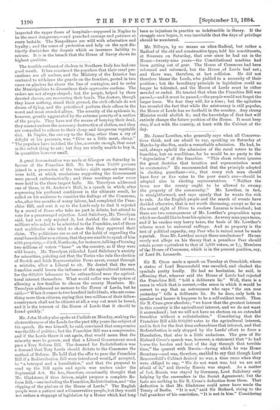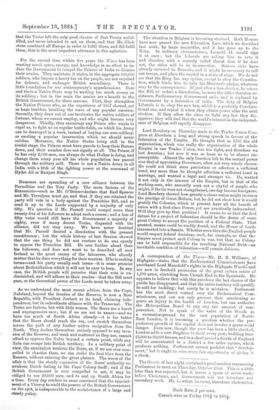Sir R. Cross made a speech on Tuesday at Ormskirk,
where a statue of Lord Beaconsfield was unveiled, and clashed the cymbals pretty loudly. He had no hesitation, he said, in affirming that, whoever said the House of Lords had rejected the Franchise Bill, "told a deliberate lie." Well, there is a. sense in which that is correct,—the sense in which it would be correct to say that an astronomer who says "the sun rose yesterday" tells a deliberate lie. So he does, only both to speaker and hearer it happens to be a self-evident truth. Then Sir R. Cross grew absolute; "we know that the greatest interest in this country is the agricultural interest, and we do not want it surrendered ; but we will not have an election on an extended franchise without a redistribution." Considering that the Franchise Bill adds 800,000 votes to the agricultural interest, and in fact for the first time enfranchises that interest, and that Redistribution is only stopped by the Lords' effort to force a Dissolution, that also is a little audacious. The gem of Sir Richard Cross's speech was, however, a statement that "he had borne the burden and heat of the day through that terrible time," the quarrel with Russia—during which he was Home Secretary—and was, therefore, enabled to say that though Lord Beaconsfield's Cabinet desired no war, a time came when they were obliged to say, "We do not want war, but we are not afraid of it," and thereby Russia was stayed. As a matter of fact. Russia was stayed by Germany, Lord Salisbury only helping by the surrenders in the Secret Agreement; but the facts are nothing to Sir R. Cross's deduction from them. That deduction is that Mr. Gladstone could never have made the Treaty of Berlin. "It is not," said Sir Richard, rising to the fall grandeur of his conviction, "It is not in him." Considering
that the Tories left the only good clauses of that Treaty unful- filled, and never intended to act on them, and that Mr. Glad- stone combined all Europe in order to fulfil them, and did fulfil them, that is the most impudent utterance in this agitation.



































 Previous page
Previous page